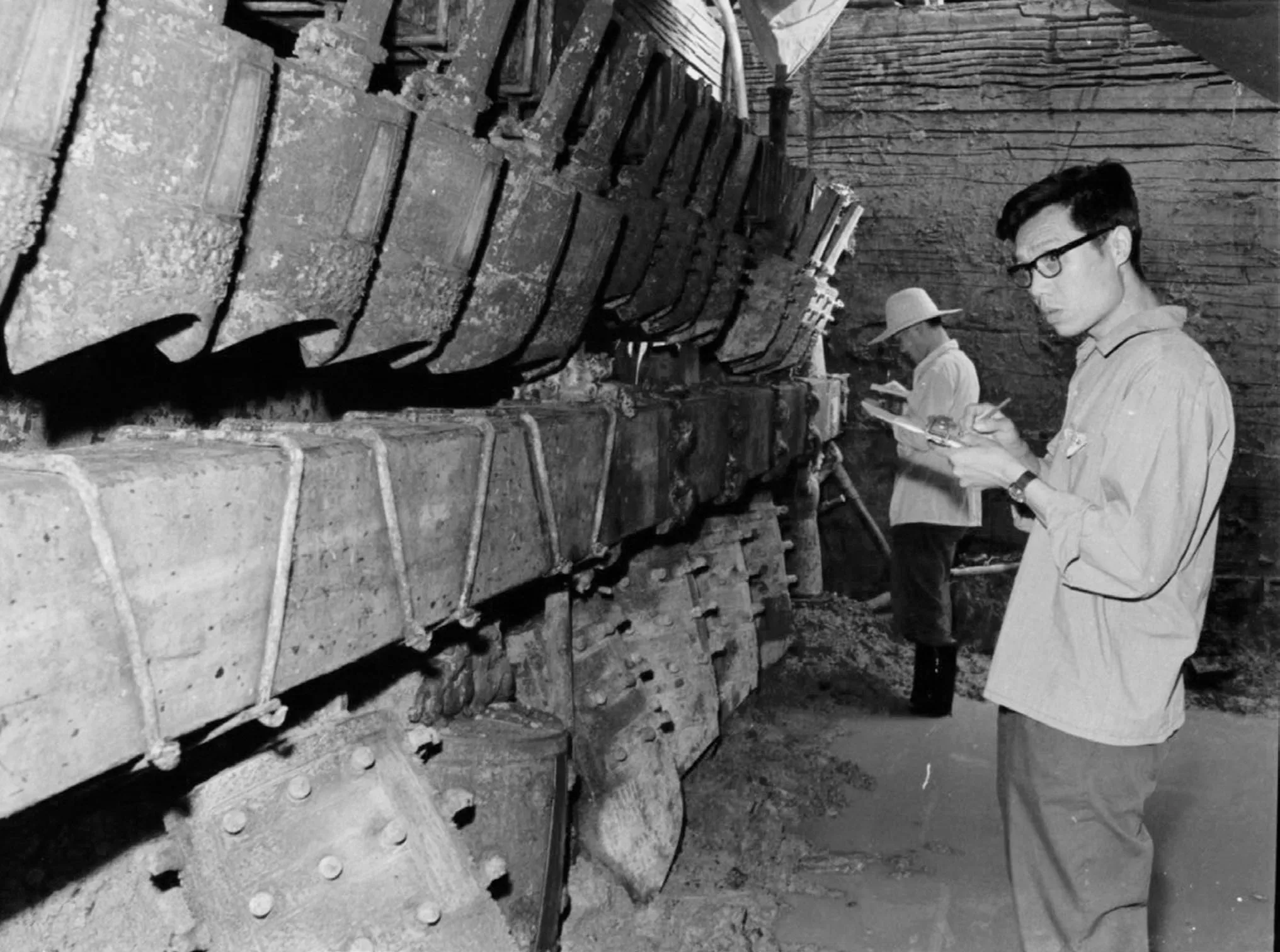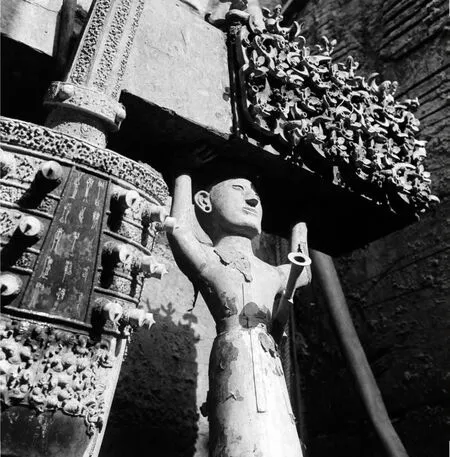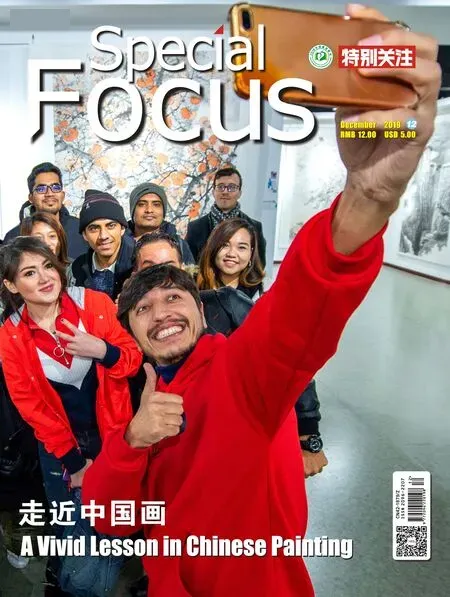A Copper Jar Was Dug up by a Local
2020-01-08TextbyLiuYishan
Text by Liu Yishan
Edited by He Sai & Bo Ning
In September 1977, Wuhan Air Force began its workshop construction.Wang Jiagui, deputy director of the Radar Repair Institute was the leader of the project.The first phase of construction started on the Eastern Slope.The Institute hired dozens of farmers from the nearby villages as laborers who took part in the excavation.
Earlier in 1967 the Institute had built a water tower on the Eastern Slope after lowering the hilltop by more than four meters when they built their barracks on the Drum-beating Mound.According to the design, another six meters were to be stripped off for this expanding construction.That is, a total of more than ten meters should be lowered from the original hilltop of the Eastern Slope.Only in this way could the new workshop meet the requirements of firmness.
After the farmers peeled off bit by bit the overburden of sand-bearing yellowish brown soil, there appeared a layer of red sandstone, which was the geological soil structure of the hills near the Drum-beating Mound.The red sandstone was very hard and difficult to excavate.
The Institute borrowed some excavators and bulldozers from the relative departments of Suixian County for the construction, and the farmers were allocated tasks around in different directions to clear up the earthwork.After the excavators and bulldozers dug a few meters down and pushed forward a few meters, the rock became harder and harder.The excavators' attempts left only a few scratches on the rock, and when the shovel of the bulldozer pushed it, the rock was motionless.
这天上午,他们挖到离地面两三米的地方,梁升发手中的铁锹插入土中,锹刃咯嗞一响,似乎碰到了什么硬东西。梁升发抽出铁锹,把四周的地层刨开一看,是只生了绿锈的罐子形状的青铜器。
他们继续小心地探试着挖土,一连挖出了二十几件青铜器。
这些青铜器,有的像坛子,有的像罐子,有的像香炉,有圆形带三只脚的,有长方形带四只脚的,还有像灯座形状的,此外还有铜箭头。

Workers taking a record of the chime-bells
Encouraged by the revolutionary spirit and in order to speed up the construction process, the superintendent ordered the workers to punch holes on the rock and inserted TNT explosive in them to blow up the rocks.
After the explosions, the rock broke and got loose.
Then the bulldozers removed the crushed loose rocks, and the farmers helped clear away the gravel.As more hands were needed, the Institute again hired more farmers from the nearby villages, and now the membership of construction team reached more than 100.
Over the Eastern Slope of the Drum-beating Mound, the sound of the machines rumbled and the sound of blasts resounded through the valley.The farmers sang loudly a song composed from Chairman Mao's quotation, “Making up your mind, being not afraid of sacrifice, surmounting all difficulties, and fighting for victory” while working very hard for the building of the defense works, paying no mind to the sweat pouring down from their faces.The scene was really spectacular.
At that time Liang Shengfa, a farmer from the 8th production team of the Unity Brigade of the commune in the suburbs of Suixian County and an accountant of the production team, also participated in the excavation for the construction at the new workshop at the Drumbeating Mound.
梁升发在与几个社员七嘴八舌地讨论了他挖回的破铜烂铁后,觉得这堆东西实在派不上什么用场,还不如砸碎卖给废品站,换几个油盐钱。
梁升发拿起锤子正准备砸向铜罐子铜坛子的时候,解德敏带人刚好赶到。解德敏大喊一声:“不许砸!”一个箭步冲到梁升发身边,挡住了梁升发正要下砸的锤子。
These workers went out early and returned late and everyone felt happy and proud to work there.
Liang Shengfa and his niece Liang Aiqin were assigned to remove the earth on the east side of the hill of the construction site.Here the soil was relatively softer and the soil texture was varied.Their work was done fairly smoothly.
One day in the morning, they were digging two or three meters deep into the ground.When the shovel in Liang Shengfa's hands went into the earth, the spade's edge gave a creaking sound, and it seemed to have hit something hard.Liang Shengfa pulled out the spade, opening the surrounding layer, and finding a bronze ware in the shape of a jar covered with green rust.
They went on to dig up the earth carefully and pulled out more than twenty pieces of bronze.
Among those bronze appliances, some looked like pots, some like jars, some like incense burners.Still others were in circular shapes with three feet, some rectangular with four feet, and some looked like lamp holders.Besides, there were also copper arrowheads.In these bronzes, the big ones had a weight of more than ten jin (1 jin≈1.1 pounds), and the small ones only a couple of liang (1 liang≈1.8 ounces).As they were surrounded by loose soil, and they did their work meticulously, all of the bronze artifacts were in good shape, absent from any damage.
Facing such a big pile of relics, Liang Shengfa took off his jacket and covered them up without making any fuss, afraid of being plundered by other farmers after they found out.Liang Aiqin helped his uncle take care of the pile of things and kept them a secret.
The day's work was over, and Liang Shengfa waited until all the other farmers were away.He divided the pile into two parts, the copper pots and copper jars and wrapped them up respectively in his jacket and went out with the bags on his back.

Chime-bells unearthed with other historical relics
Liang Aiqin followed his uncle, shouldering the tools for him.
When they were leaving the barracks, the guard stopped them at the gate, as the bags they carried were very big and heavy, and quite eye-catching.Liang Shengfa put down the two bags of bronze and told the guard they were useless pieces of iron and copper he dug out of the ground.It was a waste to discard them and he planned to take them back for some use in raising pigs and feeding chicken.
Liang Aiqin also helped his uncle testify that they had indeed dug these things out of the ground.
The guard took the two bags and looked into them.All he found was a pile of broken iron and copper pieces.He couldn't decide what they were for.Anyhow, they were not things from the army barracks.
Seeing that the guard did not make any comments, Liang Shengfa carried the two bags and left.Liang Aiqin picked up the tools and followed closely behind.Watching the two of them hurrying away, the guard didn't block them by force nor chase after them.
After Liang Shengfa took home the pile of broken iron and copper, he spread them out piece by piece in the courtyard and said to his wife: “Take a look at this stuff and see if there is anything useful.”
Liang Shengfa got a lot of fancy stuff from the Drumbeating Mound! The news soon spread in the village and all the villagers hurried to Liang's home to join in the scene of bustle.
“I thought you've got some gold and silver! Look at those broken copper wares! They might be worth something when crushed to pieces and taken to the recycling station!” one wellinformed villager said.
Another villager remarked: “Look! What are in those jars? God knows if there should be some sort of treasures.”
It made sense for Liang Shengfa to hear it.Maybe there was really something in them! He forced open one of the jars with a spade, and to his great disappointment, it was filled merely with dirty water covered with greenish rust on the surface, and some bony pieces.
Some said they were human bones, and some assumed that they were the leftovers of animal ribs left by ancient people.
At the same time, the guard at the gate of the barracks, seeing Liang Shengfa taking away two bags of broken copper and iron wares, he thought he should anyhow report to the leader, even though he didn't stop him.
Thus, the guard reported what had happened a short while ago to the political instructor.
The instructor recalled the scenes in the filmAncient Tombs at Mawangduiwhich was shown in the barracks not long ago, where the historical relics also looked like broken copper and ironwares.Could it be that the farmer had dug out some historical relics?
The instructor immediately ran to the institute office and it so happened that Wang Jiagui and Xie Demin, the two deputy directors were there.The instructor reported it to them.
Wang Jiagui and Xie Demin were talking about the bulldozer pushing out beneath the red sandstone brown soil, which seemed to have been filled manually.Would it herald an ancient tomb there?
Just at that time, the company instructor came and reported a farmer digging out some copper wares and taking them back home.On hearing this, both of them were greatly taken aback, and decided to send someone to retrieve the historical relics right away.
Xie Demin, who was in charge of the farmers, was quite familiar with the environment.He hurried to Liang Shengfa's home at the 8th production team of Unity Brigade with several soldiers.
After much discussion with several villagers about the broken iron and copper pieces, Liang Shengfa found that these things were not really of much use and decided to crush them and send them to the recycling station for some money in exchange for salt and vegetable oil.
The moment Liang Shengfa held up the hammer, ready to hit the broken copper pots and jars, Xie Demin and his entourage arrived just in time.
“Don't smash them!” Xie
Demin gave a loud shout, and rushed with one swift stride to Liang Shengfa and blocked the hammer which was about to fall.
Xie Demin said to Liang Shengfa: “Accountant Liang, these are dug out from the ground, they are precious historic relics, and should be submitted to the state.You are a cadre of the production team and you should set a good example.”
Note:
Western Han Tombs at Mawangdui (马王堆) were excavated in 1972-1974 in Hunan Province.
Hearing that they were cultural relics and should be handed over to the state, Liang Shengfa hurriedly apologized and said: “Director Xie, you are right to blame me for my lack of awareness.I have no sense of their value.I really do.I thought these broken copper and iron pieces were useless.Thank heavens you have come.Just take all of them away! All of them are here and none were damaged.”
Together with the soldiers who came with him, Xie Demin carried the relics back to the barracks at the Drum-beating Mound.
In recognition of Liang Shengfa submitting the cultural relics, the Institute sent four people, including Director Guo of the Political Department to Liang Shengfa's home and awarded him two sets ofSelected Works of Mao Zedong, one was a 32mo paperback edition, the other a 64mo hardcover with red plastic cover.It was a high honor to get such two sets of books as an award at that time.
The excavation of historical relics by Liang Shengfa played a very important role in the later discovery of the tomb of Marquis Yi of the Zeng State and the valuable cultural relics unearthed there.
The result of the excavation of the tomb of Marquis Yi of the Zeng State led to the discovery of a group of tombs at the Drumbeating Mound.According to the analysis of the archaeologists, the bronzes unearthed by Liang Shengfa could have been the objects in the funeral pit of the tomb of Marquis Yi of the Zeng State.Liang Shengfa was the person who dug out the first unearthed cultural relics in the Drum-beating Mound.
The Drum-beating Mound had been in a sound sleep underneath the earth for thousands of years, having experienced the baptism of wars, sprinkled with rain and snow, watched the alteration of dynasties and witnessed the withering and flourishing of the trees.Fires tried to burn them in vain, and they rose again when spring winds blew.
The Drum-beating Mound, squatting in the long river of time, embracing a giant secret and burying with it the amazing treasures, was about to demonstrate its magnificence and charm amidst the thundering sound of the mountain-breaking cannons.
(FromStories of the Chime-bells, Changjiang Literature and Art Publishing House.Translation: Luo Dongyuan)
根据曾侯乙墓发掘之后又发现的擂鼓墩墓群,考古专家分析,民工梁升发挖出的青铜器,应是曾侯乙墓陪葬坑里的物品。梁升发是挖出擂鼓墩第一批出土文物的人。
